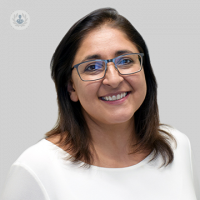What you need to know about breast reconstruction surgery
Written in association with:Miss Harleen K Deol is a leading oncoplastic breast surgeon and expert in performing breast cancer surgeries and reconstructions. Here Miss K Deol summarises the different types of breast reconstructions, the advantages and drawbacks of each and how they are performed.
What types of breast reconstruction are there following breast cancer surgery?
Firstly, it is important to really emphasise what the aim of breast reconstruction is; and that is twofold. Firstly, the aim is to recreate and replace volume and secondly, to achieve symmetry with the other breast. Both of those are equally important. One can do this either by using an implant and an implant-based reconstruction, or using your own tissue, which is called an autologous reconstruction.

What advantages and disadvantages does implant reconstruction have?
Implant-based reconstructions are the most popular or common type of reconstruction performed in the UK, with about 90% of women choosing to have it and the majority of them choosing to have it at the same time as their mastectomy for their cancer surgery. Implant based reconstruction can replace the volume and also give a very definitive, pert shape to the breast.
Advantages of implant-based reconstructions:
- Least complex procedure
- Least time spent in theatre
- Patients can go home the same day or next day following surgery
- Recovery is shorter, with return to normal activities within four weeks
The main possible drawback of implant-based reconstructions is the potential lifespan of the implant and the effects of wear and tear and ruptures. However, modern-day implants can last a lifetime, with less than one in ten rupturing after ten years.
Secondly, the next potential risk is the risk that the implant has to be removed within three months of surgery due to infection. However, infection rates are low and your surgeon will know how often they are required to remove their implants in the reconstruction setting. For me, that is less than one in twenty occasions.
The next risk is the risk of something called capsular contracture, which is your body's immune response to the implant. Your body's immune response recognises the implant as something foreign and walls it off. That wall can be thought of as a capsule which is paper-thin, such as cling film. The problem here is that for some women that capsule can thicken and harden over time, causing the implant to become misshapen, ultimately leading to pain. The only way really to deal with this is a repeat operation to remove that capsule. However, the risk of capsular contracture is low and less than 1 in 20 women develop it at 10 years.
The last risk is something we are learning more about is a type of lymphoma called ALCL. This is very rare but can develop in a capsule around the implants. Once detected it is very treatable and removing the capsule will cure you of that disease.
What advantages and disadvantages does 'flap' reconstruction have?
A flap-based reconstruction uses your own tissue to recreate breast volume and also to try to achieve symmetry. Using your own tissue can recreate volume and that can be done at the same time as your cancer surgery or at a later date. Many women believe that using their own tissue gives them a natural feel compared to the other type of reconstruction. However, it is one that fewer women choose.
This may be because it is a more complex surgery and can often take a longer time in theatre with a longer recovery time (some patients need to spend up to a week in hospital afterwards, particularly if fat from their abdomen is used for the reconstruction). The advantages of using your own tissue though is that it may naturally change as your normal breast tissue would change. You may be able to get that normal, natural droop that happens as women age which you would not get with an implant-based reconstruction.
The next advantage is that in the long-term it is a stable reconstruction, whereas with the use of implants you may get complications as time goes by.
Therefore, then possible disadvantages are because the operation is more complex, it requires a longer recovery and so that must really be balanced when patients make a choice about what type of reconstruction is best suited for them.
What will my surgeon do to ensure symmetry if I have only had a single mastectomy?
This comes back to the importance and role of breast reconstruction, which is not only to replace volume, but also to achieve symmetry. Therefore, when one does a mastectomy and reconstruction, we look to achieve a particular shape, as well as volume. For many women who have a natural droop to their breasts, this may create a difference from that side to the reconstructed breast. Hence, quite often I recommend to my patients a breast reduction or a breast uplift so that they get that symmetry.
If you are seeking advice on breast cancer surgery and breast reconstruction options, make an appointment with an expert.


